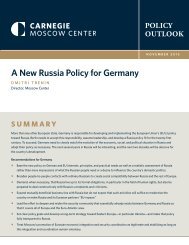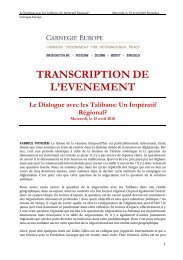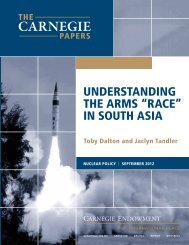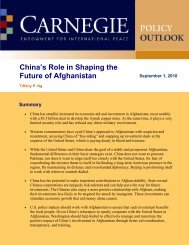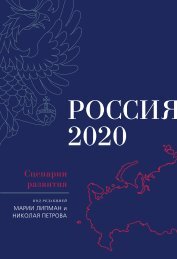Democracy Promotion Under Obama - Carnegie Endowment for ...
Democracy Promotion Under Obama - Carnegie Endowment for ...
Democracy Promotion Under Obama - Carnegie Endowment for ...
You also want an ePaper? Increase the reach of your titles
YUMPU automatically turns print PDFs into web optimized ePapers that Google loves.
DEMOCRACY PROMOTION UNDER OBAMA: FINDINg A WAY FORWARD 5<br />
other areas of U.S. strategic or economic engagement<br />
with nondemocratic states, such<br />
as with Azerbaijan, Ethiopia, the Gulf states,<br />
Kazakhstan, and Pakistan, the Bush administration<br />
downplayed democracy <strong>for</strong> the sake of<br />
other interests. Furthermore, although Bush<br />
tried to cast his war on terrorism as a freedom<br />
crusade, in fact the imperatives of cooperation<br />
on counterterrorism led to a warming<br />
up, rather than a cooling off, of ties with the<br />
governments in many authoritarian or semiauthoritarian<br />
countries in South Asia, Central<br />
Asia, the Middle East, Africa, and elsewhere.<br />
The Bush administration did take some<br />
visible stands on democracy. For the most<br />
part, however, these were toward states where<br />
the United States does not have any significant<br />
countervailing interests, such as Belarus,<br />
Burma, Cuba, and Zimbabwe. The administration<br />
also pursued quiet, low-level ef<strong>for</strong>ts<br />
using behind-the-scenes diplomatic cajoling<br />
and counseling, democracy assistance, and<br />
modest economic carrots and sticks to help<br />
many struggling new democracies consolidate<br />
political re<strong>for</strong>ms, especially in parts of sub-<br />
Saharan Africa, Central America, Southeastern<br />
Europe, and Southeast Asia. These were valuable<br />
ef<strong>for</strong>ts, but they represented continuity<br />
much more than change, drawing on policies<br />
and programs largely established in the 1990s<br />
and be<strong>for</strong>e.<br />
In short, Bush policy was substantially realist,<br />
leavened with some moderate Wilsonian<br />
elements, primarily around the edges. The idea,<br />
there<strong>for</strong>e, that a major post-Bush realist corrective<br />
is needed represents a serious misreading of<br />
the past eight years. Even Bush himself was<br />
confused by the disjunction between his highoctane<br />
prodemocracy rhetoric and his much<br />
more realist policies on the ground, as highlighted<br />
by his rather poignant (yet also rather<br />
odd) remark in 2007 that he felt like “a dissident”<br />
with regard to his own <strong>for</strong>eign policy.<br />
unnecessary Pessimism<br />
Rising pessimism about the state of democracy<br />
in the world also contributes to the per-<br />
ceived need <strong>for</strong> a backing away. In this view,<br />
the United States should not sail hard into a<br />
headwind but rather trim its prodemocracy<br />
sails and wait <strong>for</strong> better times. Bad news on<br />
democracy has indeed been plentiful in recent<br />
years—coups, electoral violence, the greater<br />
assertiveness of energy-rich authoritarians,<br />
In short, democracy is not in retreat around the<br />
world. a continuation of the long-term decline of<br />
tyranny and at least modest advances in democracy<br />
are certainly imaginable <strong>for</strong> the decade ahead.<br />
the rise of the China model, and the election<br />
of some dubious populist strongmen.<br />
In fact, however, when looked at across<br />
the length of this decade, the global trend is<br />
not so bad. As the 2009 Freedom House report<br />
details, since 2000 authoritarianism has<br />
decreased—the number of not-free countries<br />
has declined from 48 to 42—while the number<br />
of free countries has risen from 86 to 89.<br />
Democratic setbacks have indeed occurred,<br />
but so too have democratic advances, usually<br />
attracting much less U.S. media attention,<br />
such as the quiet, but highly significant, democratic<br />
progress of Indonesia and the anchoring<br />
of ten postcommunist states as members<br />
of the European Union. The high price of oil<br />
between 2005 and 2008 did bolster many authoritarian<br />
regimes, but the sharp drop since<br />
is now unsettling them. And while Russia’s<br />
and China’s “authoritarian capitalism” has attracted<br />
wide interest, a significant majority of<br />
citizens in every region still view democracy<br />
as the best <strong>for</strong>m of government. The diffusion<br />
of new communication technologies continues<br />
to open innovative avenues <strong>for</strong> citizen empowerment<br />
and peaceful resistance to authoritarianism.<br />
The global financial crisis is putting<br />
new pressures on many struggling democracies<br />
but is also causing many authoritarian<br />
governments to feel the heat of rising public<br />
dissatisfaction. In short, democracy is not in<br />
retreat around the world. A continuation of<br />
the long-term decline of tyranny and at least




